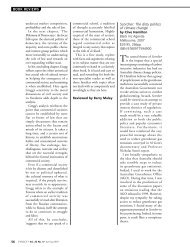Meltdown: The Inside Story of the North Korean Nuclear Crisis
Meltdown: The Inside Story of the North Korean Nuclear Crisis
Meltdown: The Inside Story of the North Korean Nuclear Crisis
Create successful ePaper yourself
Turn your PDF publications into a flip-book with our unique Google optimized e-Paper software.
ook reviews<br />
like so many Americans, focuses<br />
only on what he conceives to be<br />
American strategic interests. Thus,<br />
he underestimates <strong>the</strong> risk that <strong>the</strong><br />
<strong>North</strong> <strong>Korean</strong> missile and nuclear<br />
threat to Japan will so undermine<br />
Japanese confidence in <strong>the</strong> US ‘nuclear<br />
umbrella’ that Japan will decide that it<br />
needs its own nuclear weapons.<br />
In Bush’s final days in <strong>of</strong>fice, <strong>the</strong><br />
Japanese show palpable anger at<br />
<strong>the</strong> president’s betrayal <strong>of</strong> Japanese<br />
interests in striking this latest ‘deal’<br />
with <strong>North</strong> Korea. <strong>The</strong> response<br />
<strong>of</strong> <strong>the</strong> Bush administration is that<br />
Japan just has to get out <strong>of</strong> <strong>the</strong> way.<br />
So much for <strong>the</strong> ‘realists’ in <strong>the</strong><br />
Bush administration, who used to<br />
pillory Clinton for his ‘appeasement’<br />
<strong>of</strong> <strong>North</strong> Korea.<br />
Yet Japan has all it needs to make<br />
nuclear weapons, except warhead<br />
technology. And that would not stop<br />
Japan for long. It’s not just <strong>North</strong><br />
Korea that Japan is worried about.<br />
A far bigger threat is China, which<br />
targets Japan with nuclear weapons.<br />
Indeed, Japan may be starting to<br />
think that it can no longer rely on<br />
US-extended deterrence where China<br />
is concerned.<br />
Chinoy, like many American<br />
liberals, is inclined to underestimate<br />
<strong>the</strong> fear that drives policy in many<br />
countries now that <strong>the</strong> Cold War is<br />
over. If Japan comes to think that it<br />
can no longer afford to rely on <strong>the</strong><br />
US ‘nuclear umbrella’ that sheltered it<br />
during <strong>the</strong> Cold War, our region could<br />
soon see <strong>the</strong> rapid spread <strong>of</strong> nuclear<br />
weapons. <strong>The</strong> US focus on <strong>North</strong><br />
Korea should begin with <strong>the</strong> need to<br />
keep Japan reassured, not with <strong>the</strong><br />
delusion that ‘real negotiations’ would<br />
lead to <strong>North</strong> Korea’s abandoning<br />
nuclear weapons. But with Obama<br />
about to succeed Bush, that is a<br />
faint hope.<br />
Reviewed by Robyn Lim<br />
Grand New Party: How<br />
Republicans Can Win <strong>the</strong><br />
Working Class and Save <strong>the</strong><br />
American Dream<br />
by Ross Douthat and<br />
Reihan Salam<br />
Doubleday<br />
New York, 2008<br />
US$23.95, 256pp<br />
ISBN 9780385519434<br />
With Democrats in control<br />
<strong>of</strong> <strong>the</strong> presidency and both<br />
houses <strong>of</strong> Congress, <strong>the</strong> Republican<br />
Party is set to experience <strong>the</strong> period<br />
<strong>of</strong> introspection and infighting<br />
that inevitably follows electoral<br />
defeat. A work germane to <strong>the</strong>se<br />
reflections is Grand New Party by<br />
Ross Douthat and Reihan Salam,<br />
modestly subtitled How Americans<br />
Can Win <strong>the</strong> Working Class and Save<br />
<strong>the</strong> American Dream.<br />
Despite <strong>the</strong> elite media obsession<br />
with <strong>the</strong> Iraq War and ‘unilateralist’ US<br />
foreign policy, public disenchantment<br />
with <strong>the</strong> Bush administration stems<br />
from domestic failures more than<br />
military adventurism, and this is <strong>the</strong><br />
focus <strong>of</strong> Grand New Party.<br />
Slightly more than half <strong>the</strong> book<br />
is devoted to a history <strong>of</strong> modern<br />
US conservatism, beginning with<br />
<strong>the</strong> maternalist movement at <strong>the</strong><br />
beginning <strong>of</strong> <strong>the</strong> twentieth century.<br />
<strong>The</strong> authors <strong>the</strong>n attempt to diagnose<br />
<strong>the</strong> domestic policy shortcomings<br />
that have cost <strong>the</strong> Republicans <strong>the</strong><br />
working-class base Ronald Reagan<br />
won over three decades ago. Finally,<br />
<strong>the</strong>y prescribe key elements <strong>of</strong> a<br />
new policy agenda designed to woo<br />
<strong>the</strong>m back.<br />
<strong>The</strong> lengthy historical survey may<br />
seem excessive to readers enjoying<br />
broad familiarity with twentiethcentury<br />
US politics. It is none<strong>the</strong>less<br />
necessary, as <strong>the</strong> authors use this<br />
survey as a source <strong>of</strong> insights with<br />
which to diagnose contemporary<br />
failures.<br />
<strong>The</strong> book’s central <strong>the</strong>sis is that<br />
both major political parties have<br />
failed to acknowledge <strong>the</strong> challenges<br />
that beset <strong>the</strong> American working class.<br />
Most Republicans would agree with<br />
<strong>the</strong> authors’ sketch <strong>of</strong> a Democratic<br />
Party that actively undermines <strong>the</strong><br />
social mores that, while burdensome<br />
for affluent coast-dwelling elites,<br />
are a necessity for hard-pressed<br />
working-class Americans struggling<br />
to maintain <strong>the</strong> family stability that<br />
stands between <strong>the</strong>m and poverty.<br />
Yet while <strong>the</strong> Republican Party<br />
caters to this need with its social<br />
policies, <strong>the</strong> authors argue that it turns<br />
a blind eye to <strong>the</strong> growing income<br />
disparities between socioeconomic<br />
classes, which are entrenching <strong>the</strong><br />
power <strong>of</strong> an educated elite and<br />
undermining <strong>the</strong> American Dream<br />
<strong>of</strong> class mobility. It also ignores <strong>the</strong><br />
growing sense <strong>of</strong> economic insecurity<br />
faced by working Americans, even<br />
before <strong>the</strong> financial crisis, about <strong>the</strong><br />
safety <strong>of</strong> <strong>the</strong>ir jobs in an economy<br />
marked by <strong>of</strong>fshoring <strong>of</strong> increasingly<br />
high-end activities.<br />
<strong>The</strong> authors argue that <strong>the</strong><br />
current trend will lead to a politics<br />
driven by greater xenophobia and<br />
economic populism, with <strong>the</strong> US<br />
morphing into something more<br />
akin to a European welfare state. If<br />
<strong>the</strong> Republicans are not interested in<br />
proposing a solution to working-class<br />
insecurities, <strong>the</strong> Democrats will.<br />
Douthat and Salam paint a grim<br />
picture <strong>of</strong> <strong>the</strong> possible future:<br />
Imagine higher taxes, vastly<br />
expanded public sector<br />
employment, infantilized<br />
upper-middle-class men and<br />
women who live with <strong>the</strong>ir<br />
parents because <strong>the</strong>ir jobs<br />
don’t pay <strong>the</strong>m enough to<br />
buy a house <strong>of</strong> <strong>the</strong>ir own,<br />
illegitimacy rising toward 50<br />
percent and a growing social<br />
services bureaucracy that<br />
steps in to pick up <strong>the</strong> slack,<br />
plunging birthrates as rearing<br />
Policy • Vol. 24 No. 4 • Summer 2008–09 57



